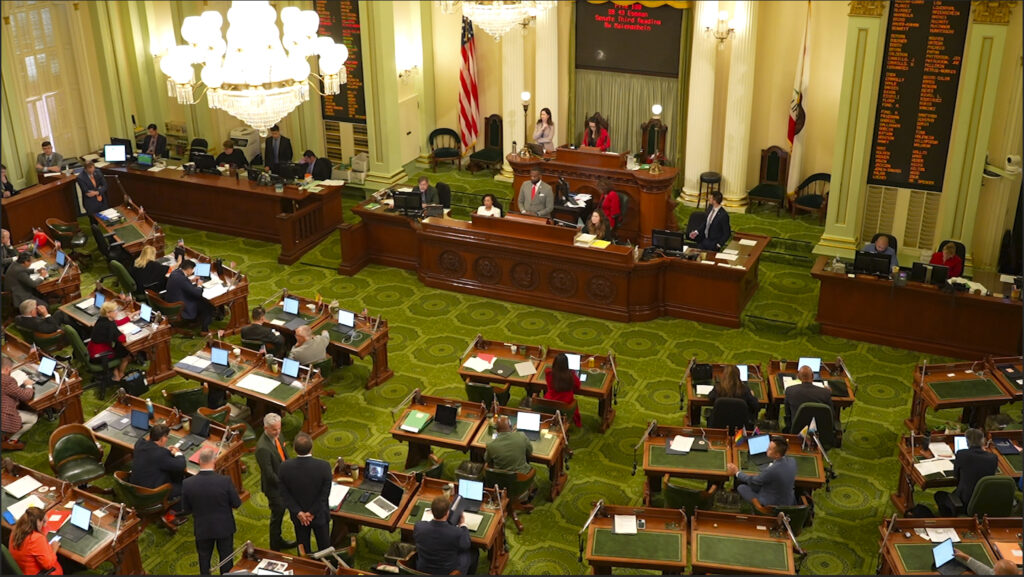Two years after California schools reopened their classrooms to in-person instruction following the Covid-19 pandemic, students continue to struggle – both academically and emotionally.
Both of these factors are deeply connected and recovery requires a team effort, according to panelists at the EdSource round table Nov. 15 discussion, “Reenergizing learning: Strategies for getting beyond stagnant test scores.”
Getting California’s learners back on track, panel members agreed, involves the work of school administrators, teachers, parents and the students themselves.
“Students came back, not just with some of this delayed learning, but they lost a lot of opportunities for socialization, which has led to different kinds of behavior in school that make readiness to learn more difficult,” said Heather J. Hough, executive director of Policy Analysis for California Education.
Keeping students engaged
With chronic absenteeism soaring across the state from 12.1% in 2018-19 to 30% in 2021-22, the panelists said it is critical for schools to go beyond targeting specific causes for absenteeism – and create a culture where students feel excited to go to school.
“Kids need to feel a sense of belonging, a sense of being valued and cared about,” said Yolie Flores, president and CEO of Los Angeles-based Families in Schools.
“…..But I don’t see as much of a focus on [social, emotional] side of the learning. And I wonder if it’s because we still don’t really understand how children learn and what sparks that fire to want to learn.”
Members of the panel discussed programs that are used to gauge students’ concerns so they can be addressed. The San Ramon Valley Unified School District, for instance, holds more regular screenings to measure students’ sense of belonging through a partnership with UC Berkeley, in addition to the statewide California Healthy Kids Survey.
The district is also piloting a diagnostic tool that provides immediate feedback to teachers on students’ thoughts about belonging in their specific classrooms.
Further south, Adalberto Hernandez said at George Washington Elementary School in Madera Unified School District, students recite affirmations: “I am loved; I am valued; I matter,” they declare each morning.
John Malloy, the superintendent of San Ramon Valley Unified, added that schools and educators need to do a better job of getting to know students’ needs as well as their “strengths, interests and passions.”
A big part of why kids decide to come to school, Hough said, depends on answers to certain questions: “How does this fit into the future that I envisioned for myself? Am I getting the right kinds of training for my college or career goals, or the life that I want to live?”
Malloy added that the most impactful strategy “is listening to our students, creating the conditions for them to share their voice and their wisdom, whether it’s kindergarten or 12th grade.”
Support for teachers
Students aren’t the only ones affected by the pandemic: teachers need to be equally supported, because their jobs have gotten harder in the past couple years, panelists said.
“Teachers have been tasked with the job of accelerating learning, but they’re facing much more difficult student needs and, maybe in some cases, students who aren’t in school,” Hough said, adding that there’s widespread vacancies because of problems in filling various school positions.
Parental involvement
Parents, however, are not fully aware of the academic struggles their children may be going through – even though they can play a major role in their child’s achievement.
Flores, the president and CEO of Families in Schools, said a nationwide Learning Heroes survey of families found that 92% of families believe their children are on track in reading and math.
“There’s confusion between what they see from the state. There’s confusion from the report cards that generally say that their kids are getting A’s and B’s, and yet they’re not reading at grade level,” Flores said.
“So what needs to happen is much more clarity and targeted information to families so that they can understand specifically how their children are doing.”
Some parents may want to be more present at their child’s school but may be limited by their work schedules, making involvement challenging. Even in cases where parents may take the time to visit their children’s classroom, they don’t always know what to look for in terms of effective instruction.
“It’s nice when parents are involved, but in a community like ours, we’re not depending on that for student success,” Hernandez said. “We communicate. We involve them. We invite them, and we do events like the Calenda traditional celebration in the state of Oaxaca in Mexico, and we had great parent involvement after hours. But during the school day, it’s on us.”
Classroom approach
Getting students to learn – and not just memorize material – is also vital, according to the panelists.
“I’ve been taught to take tests, but I’m not sure I know how to learn,” Malloy said a student told him during a Student Voice Circle, and that the statement has stuck with him, and that his district has since broadened their vision for success.
“If kids are thriving, it means that they are true, independent learners when they graduate from us,” Malloy said. “They have a confidence in their ability to think and to create.”
One strategy to help students really learn, panelists said, is to focus on teaching a few concepts thoroughly rather than covering a broader range of topics on a more cursory level.
If done properly, tutoring also helps, Hough said.
“What makes tutoring effective,” Hough said, “is that those tutors are trained, that they’re being asked to do things that are aligned with the instructional strategies that the teacher is using, so that that’s….reinforcing what they’re learning in school.”




